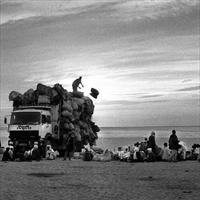SAHEL: Voices from clandestinity

The International Organization for Migration estimates that up to 35,000 sub-Saharan clandestine migrants leave for North Africa and Europe every year. But researchers concede the near impossibility to track what is carried out in secrecy, facilitated by family connections and favours, bribes and beatings. Despite increased security crackdowns and forced mass expulsions by North African security forces, thousands of West African migrants still attempt the desert crossing from northern Niger through the gateway town of Agadez. The following migrants IRIN met asked to remain anonymous.
Flore, Nigerian, 20 years old
“I arrived to Agadez [Niger] with a dozen friends. I want to go to Algeria, and why not continue to Germany? When I arrived to Agadez, police officers took all my money without giving me a receipt. Without money, I was left behind to somehow earn US$150 [amount needed for passage to Tamanrasset, Algeria]. I am an educated girl, a good Christian if you will, but here I have to sell my body in order to survive. It is hard for me to hold back the tears at times. Clients are never lacking here. A good number of them do not pay because they are officials. To whom would I complain?”
Ghanaian migrant, 26 years old
“I am from Kumasi in the Ashanti region of Ghana. We want to travel to Libya to work and get some money to help ourselves. If I get a lot of money in Libya, I will return to Ghana, but if I am not lucky, I will continue to Europe. My dream is to become rich because poverty brings shame to young men. I took a bus when I got to Niamey [capital of Niger] to Agadez for almost US$30. We were about twenty-five people. The Niger passengers were able to continue. The police said we had to go into a room. They said, ‘If you have a passport, pay US$10. If you don’t, US$20. US$50 to go to Dirkou [650km from Agadez]. And US$70 to go to Libya.’”
Adolf
“You are not the police, by any chance, are you? Because after promising to drive me to the Moroccan border, a Nigerien robbed me of US$500 and then turned me in to the police. I spent all day in detention.”
Ahmed, people smuggler
“This job is profitable for me. It is not tiring at all. The essential thing is to have the courage to face the job’s dangers. If the migrants are arrested, then we are all in trouble. Would we let them die in the desert? That would not make sense. [In response to migrants’ allegations that driver escorts have abandoned passengers in the desert.] Last year, I had a flat tire not far from Tadara, a water well about 100km from Arlit. I had 38 passengers, mostly Ghanaians. It took a few days to fix the car; many of them preferred to abandon the car and try to make it to the [Libyan] border on foot. The result? I heard many of them died of thirst.”
Agadez religious leader
“I help them personally, not in the name of the church. I give them advice and a little money so they can eat. That is all. They come to church sometimes on Sunday to pray with us.”
 Back and Next - Back and Next
Back and Next - Back and Next See Also - See Also
See Also - See Also